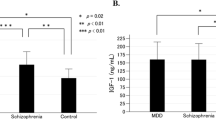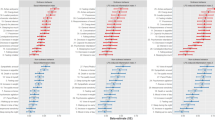Abstract
Depression has been associated with both suppression and enhancement of various aspects of immune functioning. It was of interest to determine whether cytokine alterations associated with depression, including interleukin-1 (IL-1β) and interleukin-2 (IL-2), were related to the neurovegetative symptom profile or to the chronicity of the illness. Circulating ACTH, cortisol, norepinephrine (NE) and epinephrine levels, and production of IL-1β and IL-2 from mitogen-stimulated lymphocytes were assessed in classical major depression, atypical depression (ie, with reversed neurovegetative features), and dysthymia (chronic depression without comorbid major depression) with either typical or atypical profiles, as well as nondepressed control subjects. Among atypical depressives, plasma ACTH levels were elevated while cortisol was reduced relative to controls. Irrespective of neurovegetative profile, IL-1β production was increased in dysthymic patients, and was highly correlated with age-of-onset and duration of illness. In contrast, IL-2 production was reduced in each of the groups, although less so among atypical major depressives. Moreover, IL-2 production in the depressive groups was directly related to plasma NE levels. While neither depressed mood per se nor neurovegetative features accounted for this effect, it seemed likely that chronicity of illness or age-of-onset were associated with cytokine alterations. Given that circulating cytokines influence neuroendocrine functioning, and may affect neurovegetative features, a role for interleukins may exist with respect to the pathophysiology of certain subtypes of depression.
This is a preview of subscription content, access via your institution
Access options
Subscribe to this journal
Receive 12 print issues and online access
$259.00 per year
only $21.58 per issue
Buy this article
- Purchase on Springer Link
- Instant access to full article PDF
Prices may be subject to local taxes which are calculated during checkout
Similar content being viewed by others
Author information
Authors and Affiliations
Corresponding author
Rights and permissions
About this article
Cite this article
Anisman, H., Ravindran, A., Griffiths, J. et al. Endocrine and cytokine correlates of major depression and dysthymia with typical or atypical features. Mol Psychiatry 4, 182–188 (1999). https://doi.org/10.1038/sj.mp.4000436
Received:
Revised:
Accepted:
Published:
Issue Date:
DOI: https://doi.org/10.1038/sj.mp.4000436
Keywords
This article is cited by
-
Evidence for neuroplastic compensation in the cerebral cortex of persons with depressive illness
Molecular Psychiatry (2018)
-
Association between cortisol levels and pain threshold in systemic sclerosis and major depression
Rheumatology International (2018)
-
Immunological effects of behavioral activation with exercise in major depression: an exploratory randomized controlled trial
Translational Psychiatry (2017)
-
IL-1β and BDNF are associated with improvement in hypersomnia but not insomnia following exercise in major depressive disorder
Translational Psychiatry (2015)
-
Innovative Drugs to Treat Depression: Did Animal Models Fail to Be Predictive or Did Clinical Trials Fail to Detect Effects?
Neuropsychopharmacology (2014)



